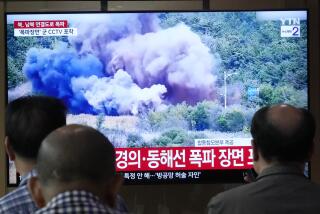Soccer Riot in Tightly Controlled North Korea Surprises Observers
- Share via
SEOUL — If the disturbance had happened anywhere else, it might have been dismissed as just another instance of soccer hooliganism. But the rowdiness that followed North Korea’s loss to Iran on Wednesday in a World Cup qualifying match in Pyongyang has raised questions about public order in what is reputed to be the world’s most controlled city.
In the televised match in the North Korean capital at Kim Il Sung Stadium, named for the country’s late founder, fans threw rocks, seats and bottles at a Syrian referee who had made an unpopular call. Thousands of people surrounded the stadium afterward, preventing the Iranian players from getting on their bus. It reportedly took two hours for North Korean soldiers and police to disperse the crowd so the Iranians could leave.
“If I were Kim Jong Il, I would be quite terrified,” said Andrei Lankov, a North Korea scholar at Kookmin University in Seoul, referring to the North’s leader. “If people can riot about football, then they can as well about the food distribution or somebody’s arrest. Something like this would have been unthinkable in Pyongyang 10 years ago.”
Paik Hak Soon, a South Korean academic who specializes in the North’s political system, said: “It is surprising for the people to act that way, and you can see when there is agitation or frustration, mobs can break out.”
Whether or not the riot was a sign of instability, it deeply embarrassed North Korea as it reemerges on the international soccer scene after a long seclusion. The North’s team hasn’t played in the final stages of a World Cup tournament since 1966, when it defeated Italy in a major upset. The squad sat out the qualifying matches for the 1998 and 2002 tournaments.
In order to participate in this year’s qualifying matches, the reclusive North Koreans were required under the rules of soccer’s governing body to host some matches at home -- a rarity in a country that is loath to admit foreigners -- and to permit televised broadcasts of the game and advertising at the venue. As a result, viewers were presented with the unusual sight of Kim Il Sung Stadium decked out with pitches for Coca-Cola and Samsung Electronics, among other sponsors.
“They had no choice. This is the first time that North Korea is hosting a fully commercialized match and these are the basic requirements,” said Samuel Ka, an official with the Korea Football Assn. in Seoul. The North Koreans “want to improve their football standards, so they need to participate in more international matches.”
In preparation for the qualifying matches, North Korea has made a considerable effort to upgrade its facilities, much of it funded by $850,000 in grants from FIFA, the international governing body of soccer. Two years ago, the North installed an artificial pitch in Kim Il Sung Stadium, and it is in the process of finishing a new training center, gymnasium and accommodations.
“It is a big deal for them,” said Paul Mony Samuel, a development officer with FIFA who has been working with the North Koreans for a decade.
“They have been very appreciative and very disciplined about completing these projects.”
The Asian Football Confederation said Friday that there were no plans to change the venue for a June 8 match in Pyongyang with Japan, but that security would be tightened. Unlike Iran, one of the few countries with which North Korea has a warm relationship, Japan is a frequent target of propaganda from Pyongyang.
Alarmed by the spectacle at the stadium this week, Japan demanded tighter security for the upcoming match.
“It is a necessary precondition for any international match that players can play safely and that spectators will be protected,” Japan’s chief Cabinet secretary, Hiroyuki Hosoda, told reporters Thursday in Tokyo.
Ri Hi Jon, a North Korean soccer association official, was quoted telling reporters Friday in Pyongyang: “We will do our best not to repeat these unusual events in the future.”
North Korea also released a lengthy statement outlining its grievances against referees at the Iran match and another game against Bahrain.
There has been some suggestion from observers that North Korean authorities at least initially orchestrated the crowd’s disruptiveness in order to express their displeasure.
A Japanese reporter at the match said loudspeakers in the stadium had instructed the 60,000-strong crowd to cheer and boo.
It appears from witness accounts, however, that the disturbance came close to getting out of control.
Most of the violence occurred after the final whistle and was not televised.
At the end of the match, Syrian referee Mohammed Kousa was stranded on the pitch for 20 minutes as the crowd threw bottles and other objects. Police and soldiers formed a cordon to hold back tens of thousands of fans who refused to leave the stands in what Scott Purchase, a sports reporter for Britain’s Daily Telegraph, called a “tense standoff.”
There were no reported injuries, but Iranian coach Branko Ivankovic said later that he had felt that he and the players were in danger.
“It was a very hostile situation on the field. Before the game and after the game many things happened that were not normal. You know when it’s a big crowd outside, everything is possible,” he told the Telegraph.
*
Hisako Ueno of The Times’ Tokyo Bureau contributed to this report.
More to Read
Go beyond the scoreboard
Get the latest on L.A.'s teams in the daily Sports Report newsletter.
You may occasionally receive promotional content from the Los Angeles Times.






